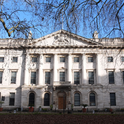Last week, the UK Nationality and Borders Bill passed in the Commons. The Bill gave the home secretary Priti Patel the power to strip British people with dual nationality or born abroad of their citizenship without needing to warn them first. Three thousand miles away, in a conference centre in Dubai, a collection of lawyers, wealth managers, immigration experts and High Net Worth Individuals (HNWIs) were selling and shopping for visas and passports. The event hosted “the right advisers and government contacts” to help applicants “get ahead in life in countries such as Canada, USA, UK, Spain, Greece, Germany, Bulgaria,” including promising to hand-hold applicants through the UK’s investor visa process, where a £2m investment can be exchanged for long-term residency. Both events are representative of shifting currents in global citizenship. But who gets citizenship—and why? Who gets to keep it—and who doesn’t?
The commodification of citizenship began in the 1980s. When the Caribbean islands of St Kitts & Nevis attained independence from Britain, the economy was hindered by a colonial-era reliance on sugar exports. Selling citizenship represented a perfect economic opportunity. An existing resource with apparently unlimited supply, low overheads and limited human capital requirements, selling passports could deliver a direct injection of cash for the government. At $150,000 for a family of four, with no obligation to live or even visit the islands, the passports include access to tax-free income and visa-free travel to over 130 countries. For St Kitts and its customers alike—a diverse group of wealthy investors largely from developing countries from which travel is restricted—there seemed to be few downsides, besides potential displeasure from other countries.
At first, uptake was slow. But after a dramatic slashing of the EU import price for sugar in 2006, the Kittitian government enlisted the help of Henley & Partners, a London law firm, to give the programme a boost. Their influence was profound. In the following eight years, the percentage of St Kitts GDP derived from the citizenship-by-investment (or “CBI”) programme jumped from 1 to 25 per cent. Today, CBI is a booming international industry worth an estimated $3bn.
In short, St Kitts commodified citizenship, and Henley commercialised it. Now operated by around 100 countries around the world, CBI programmes offer a passport or residency permit in exchange for a one-time payment or a hefty real estate investment. Prices range from $130,000 for a single applicant (Vanuatu) to several millions (the UK) to schemes about which little public information is available (Switzerland, Austria). The innovation of CBI is in bypassing the linguistic, cultural or employment-related migration requirements usually tightly enforced by governments when the person involved isn’t incredibly rich. It has also spawned an entire industry. Search “citizenship by investment” on Google and a slew of adverts for agents, lawyers, due diligence firms and advisers appear, all hungry for their share of the application fee. There are even CBI influencers: Nomad Capitalist, a YouTube channel, garners millions of views each year for videos with titles like “12 Second Residence Permits with a Simple Bank Deposit.”
Demand for passports and visas can be attributed to a range of factors including taxation, access to economic opportunity, lifestyle choices and increased security concerns. In the Middle East, the proximity of wars serves to exacerbate these trends. But there are more complex currents underlying this trajectory—currents which point to a more fundamental realignment of the meaning of citizenship.
Opening up a public good to market forces is a “high-stakes game” with multi-layered outcomes, says Ayelet Shachar, a professor of law, political science and global affairs at the University of Toronto. Nations selling citizenships must walk a fine line: sell too many, to the wrong people, and diplomatic ties are threatened and travel rights restricted—as in the case of Canada and St Kitts in 2014. In the long term, repeated one-time sales also tend to hollow out the identity and belonging required of citizenship.
More ominously, by entering into the active management of citizenship as a strategic tool, governments are incentivised to remove citizens who undercut their strategic goals. This institutionalisation of citizenship revocation is a significant development, best exemplified by Cyprus, which introduced new laws to strip investor citizens considered to have “disgraced the nation” in 2020. In the UK, the case of Roman Abramovich, whose UK investor visa was not renewed, drew press attention. Home Office figures show that there has been a striking increase in citizenship stripping since 2006, on the equally subjective grounds of protecting the public good. It is in this context that Patel’s new bill has been introduced: a further step to manage the supply of this public good. Citizenship is seen less and less as a foundation of civic involvement and increasingly as a trophy of club membership.
“For the first time in decades we will determine who comes in and out of our country,” says Patel. In fact, her innovation is not in border policing but in further undermining the historical connection between residency and belonging. This connection has been chipped away at over time, for example by the 2009 legislation which introduced the insecure status of the “probationary citizen,” fundamentally breaking the link between length of residence and right to naturalisation by allowing incomers residency and work for up to five years without any rights of settlement, or benefits like family reunion or home student fees. And in parallel, successive governments have made it easier to remove citizenship from suspected security threats. The 2002 Nationality, Immigration and Asylum Act allowed the British government to strip an individual of their citizenship as long as they held another nationality. And in 2014, the May government took the rules one step further: citizenship could be removed if the individual was able to apply for another nationality, as in the case of Shamima Begum, the British girl who joined Islamic State and has now been stripped of her passport and left in limbo since she is technically qualified for Bangladeshi citizenship, a country she has never visited.
As citizenship rides the waves of the open market, so it becomes increasingly precarious and volatile. The Nationality and Borders Bill is one example of what happens when citizenship is used as a commodity. This commodification is, in the long term, bad news for governments who need a stable, taxpaying populace committed to the nation. It also means more precarity for vulnerable groups. And in the face of a fresh wave of deaths in the English Channel and renewed diplomatic standoffs over migration, this precarity is an unwelcome development. Picking and choosing, offering and withdrawing—a new concept of citizenship sees governments more concerned with entry tickets than the main show.












